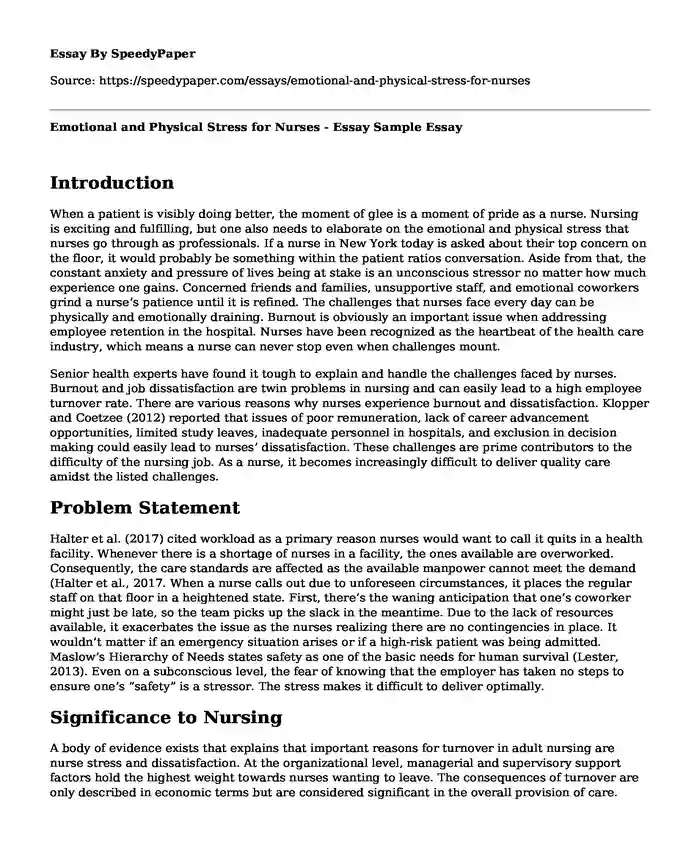
| Type of paper: | Essay |
| Categories: | Nursing Medicine Healthcare Stress |
| Pages: | 4 |
| Wordcount: | 856 words |
Introduction
When a patient is visibly doing better, the moment of glee is a moment of pride as a nurse. Nursing is exciting and fulfilling, but one also needs to elaborate on the emotional and physical stress that nurses go through as professionals. If a nurse in New York today is asked about their top concern on the floor, it would probably be something within the patient ratios conversation. Aside from that, the constant anxiety and pressure of lives being at stake is an unconscious stressor no matter how much experience one gains. Concerned friends and families, unsupportive staff, and emotional coworkers grind a nurse’s patience until it is refined. The challenges that nurses face every day can be physically and emotionally draining. Burnout is obviously an important issue when addressing employee retention in the hospital. Nurses have been recognized as the heartbeat of the health care industry, which means a nurse can never stop even when challenges mount.
Senior health experts have found it tough to explain and handle the challenges faced by nurses. Burnout and job dissatisfaction are twin problems in nursing and can easily lead to a high employee turnover rate. There are various reasons why nurses experience burnout and dissatisfaction. Klopper and Coetzee (2012) reported that issues of poor remuneration, lack of career advancement opportunities, limited study leaves, inadequate personnel in hospitals, and exclusion in decision making could easily lead to nurses’ dissatisfaction. These challenges are prime contributors to the difficulty of the nursing job. As a nurse, it becomes increasingly difficult to deliver quality care amidst the listed challenges.
Problem Statement
Halter et al. (2017) cited workload as a primary reason nurses would want to call it quits in a health facility. Whenever there is a shortage of nurses in a facility, the ones available are overworked. Consequently, the care standards are affected as the available manpower cannot meet the demand (Halter et al., 2017. When a nurse calls out due to unforeseen circumstances, it places the regular staff on that floor in a heightened state. First, there’s the waning anticipation that one’s coworker might just be late, so the team picks up the slack in the meantime. Due to the lack of resources available, it exacerbates the issue as the nurses realizing there are no contingencies in place. It wouldn’t matter if an emergency situation arises or if a high-risk patient was being admitted. Maslow’s Hierarchy of Needs states safety as one of the basic needs for human survival (Lester, 2013). Even on a subconscious level, the fear of knowing that the employer has taken no steps to ensure one’s “safety” is a stressor. The stress makes it difficult to deliver optimally.
Significance to Nursing
A body of evidence exists that explains that important reasons for turnover in adult nursing are nurse stress and dissatisfaction. At the organizational level, managerial and supervisory support factors hold the highest weight towards nurses wanting to leave. The consequences of turnover are only described in economic terms but are considered significant in the overall provision of care.
As a nurse, one will find oneself taking care of people and families in their lowest moments (Hanson, 2019). In such periods of darkness in life, poor remuneration and lack of appreciation can be highly demoralizing. McHugh and Ma (2014) posited that an overworked nurse cannot recover adequately. Additionally, it becomes relatively impossible to attain quality care to patients, which is the most gratifying part of the nursing job. The proponents of a small workforce cite the cost of hiring nurses, which fails to appreciate the fact that the move would improve productivity and overall performance (McHugh & Ma, 2014).
There is no doubt that nursing is still one of the most inspiring and fulfilling careers ever. Nurses are known for their ability to care for others and do a handful of things all at once. They are amazing at what they do and make sure that the patients, families, and everyone else is cared for. However, nurses are always not so good at remembering to take care of their own issues. Nonetheless, most can never second-guess their decision to join the nursing profession. Hill (2016) claimed that being overworked and being paid poorly cannot measure up to the feeling of satisfied patients who receive unwavering care from the professionals.
References
Halter, M., Boiko, O., Pelone, F., Beighton, C., Harris, R., Gale, J., Gourlay, S., & Drennan, V. (2017). The determinants and consequences of adult nursing staff turnover: a systematic review of systematic reviews. BMC health services research, 17(1), 824. https://doi.org/10.1186/s12913-017-2707-0
Hanson, C. (2019). I’m going to have to leave my job as an NHS nurse – I just can’t take it anymore. The Independent. https://www.independent.co.uk/voices/nursing-nhs-public-sector-pay-cap-why-im-leaving-jeremy-hunt-agency-work-salary-a7824381.html.
Hill, K. (2016). Nurses feel overworked, underpaid, and uber-stressed. Chattanooga Times Free Press. https://www.timesfreepress.com/news/life/entertainment/story/2016/jan/26/overworked-underpaid-uber-stressed/346116/.
Klopper, H., Coetzee, S., Pretorius, R., & Bester, P. (2012). Practice environment, job satisfaction, and burnout of critical care nurses in South Africa. Journal of Nursing Management, 20(5), 685-695. https://doi.org/10.1111/j.1365-2834.2011.01350.x
Lester, D. (2013). Measuring Maslow’s hierarchy of needs. Psychological Reports, 113(1), 15-17. https://doi.org/10.2466/02.20.pr0.113x16z1
McHugh, M., & Ma, C. (2014). Wage, Work Environment, and Staffing: Effects on Nurse Outcomes. Policy, Politics, & Nursing Practice, 15(3-4). https://doi.org/10.1177/1527154414546868
Cite this page
Emotional and Physical Stress for Nurses - Essay Sample. (2024, Jan 14). Retrieved from https://speedypaper.com/essays/emotional-and-physical-stress-for-nurses
Request Removal
If you are the original author of this essay and no longer wish to have it published on the SpeedyPaper website, please click below to request its removal:
- Solution-Focused Therapy Essay Sample
- Free Essay: Fat-soluble and Water-soluble Vitamins
- Free Paper on Advanced in Nurses Education
- Essay Sample on Cause and Effect of Cigarette Smoking
- Free Essay Example - Depression Guidelines
- Essay Sample on Socratic Dialogue
- Unveiling the Struggles: Impact of Military Deployments on Families' Mental Health - Essay Example
Popular categories




